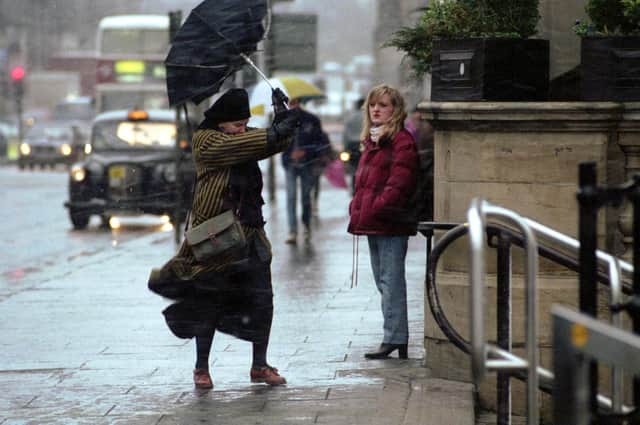Global Warming: Future extreme weather predicted for Scotland as scientists warn of a chance of 1.5°C increase to world-wide temperature


There is more than a 40% chance that the annual average global temperature in at least one of the next five years will temporarily reach 1.5°C above pre-industrial levels, according to a new report from the Met Office.
The new climate update published on Thursday, led by the UK Met Office and issued by the World Meteorological Organisation commented that these odds are increasing with time.
Advertisement
Hide AdAdvertisement
Hide AdThe update also identifies the 90% likelihood of at least one year in the five-year period becoming the warmest on record, dislodging 2016 from the top ranking.
In 2020 – one of the three warmest years on record – the global average temperature was 1.2 °C above the pre-industrial baseline.
The chance of temporarily reaching 1.5°C has roughly doubled compared to last year’s predictions.
Professor Adam Scaife, head of seasonal to decadal prediction at the Met Office, said: “Assessing the increase in global temperature in the context of climate change refers to the long-term global average temperature, not to the averages for individual years or months.
"Nevertheless, a temporary exceedance of the 1.5 degree level may already be seen in the next few years.”
Following the news, leading climate scientists are warning that urgent steps need to be taken in order to stop this increase above pre-industrial levels.
Dr Sarah Ivory, a lecturer in Climate change and business strategy at Edinburgh University told BBC’s Good Morning Scotland that if the global temperature increase does occur, then Scotland will definitely see ‘more extreme weather.’
She said: “Around the world, we’ll see greater extreme weather events, we’ll see many people dying from these hurricanes, cyclones, droughts, flooding.
Advertisement
Hide AdAdvertisement
Hide Ad"In Scotland, we'll certainly see more extreme weather. Rain when we are not expecting it, not enough rain when we are expecting it.
"This is going to lead to changes in our environment and to transport chaos at different times and possible tragedy as well as impacts on farmers and others who rely on a more stable and expected climate.”
The Paris Agreement seeks to keep global temperature rise this century below 2°C above pre-industrial levels and pursues efforts to limit the temperature increase to 1.5°C.
Asked whether it was too late to stop the climate increase in the next five years, Dr Ivory said: “We have locked in some level of climate change absolutely as we’ve known for decades now that we should change and we haven’t but we can still stop 2°C, 3°C, 4°C of warming – 4°C would be absolutely catastrophic.”
Individual action could prevent further temperature increase, Dr Ivory said, as well as within businesses and government policy.
The news comes after Shell the oil giant was ordered by a court in the Netherlands to more than double its intended carbon reductions within a decade.
In the coming five years, the annual mean global temperature is likely to be at least 1°C warmer - within the range 0.9°C – 1.8°C - of pre-industrial levels.
The 2021 United Nations Climate Change Conference – COP26 – will be held in Glasgow this November with global leaders discussing wide-scale action needed to prevent global warming.
A message from the Editor:
Thank you for reading this article. We're more reliant on your support than ever as the shift in consumer habits brought about by Coronavirus impacts our advertisers.
If you haven't already, please consider supporting our trusted, fact-checked journalism by taking out a digital subscription.
Comments
Want to join the conversation? Please or to comment on this article.
